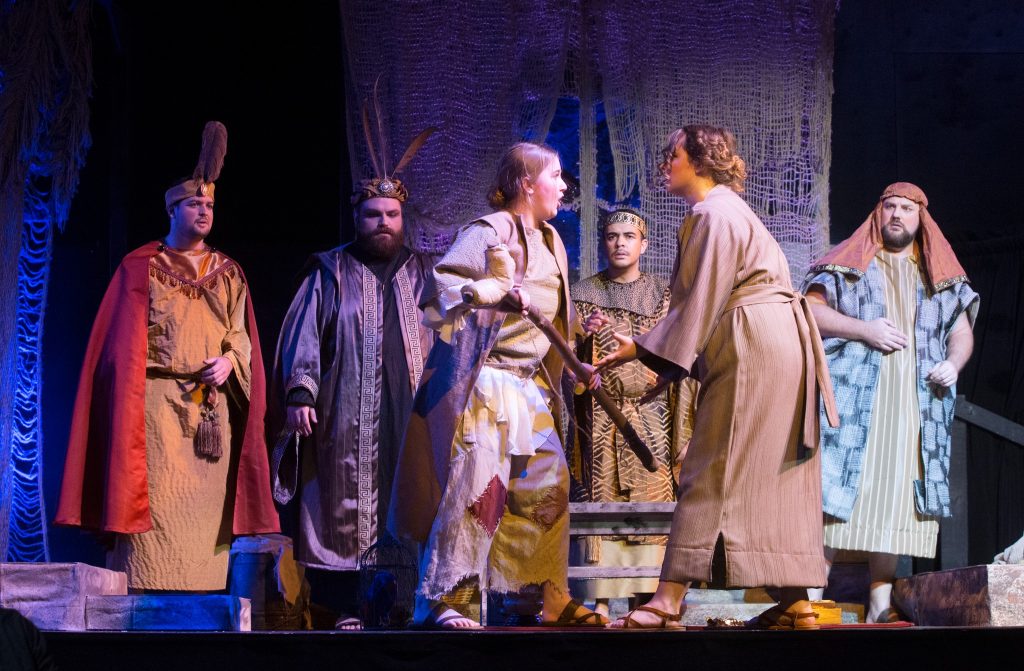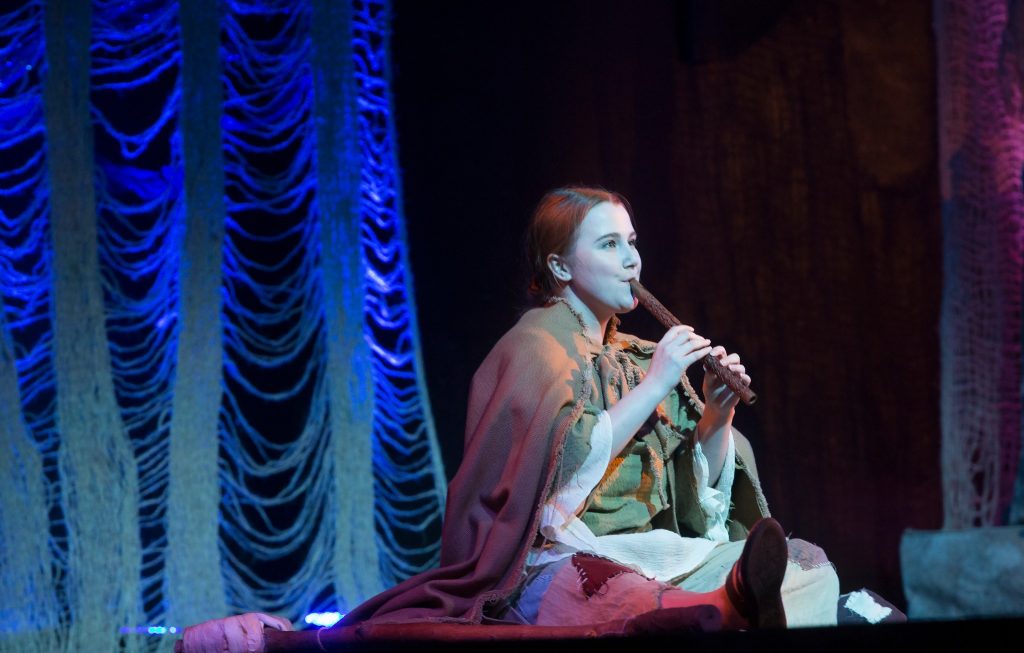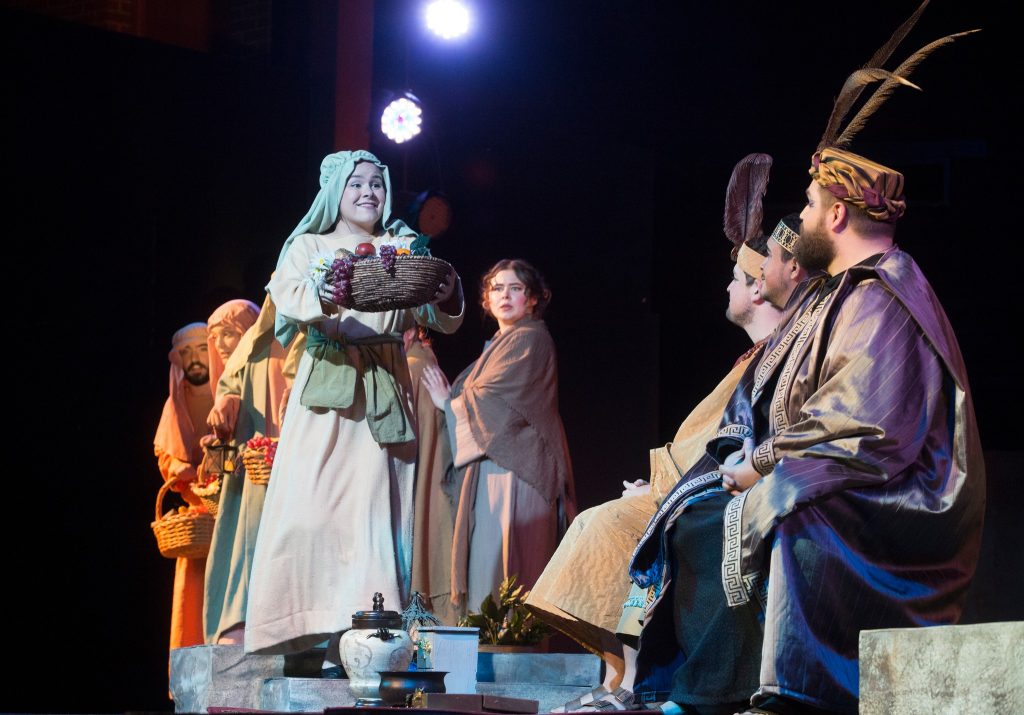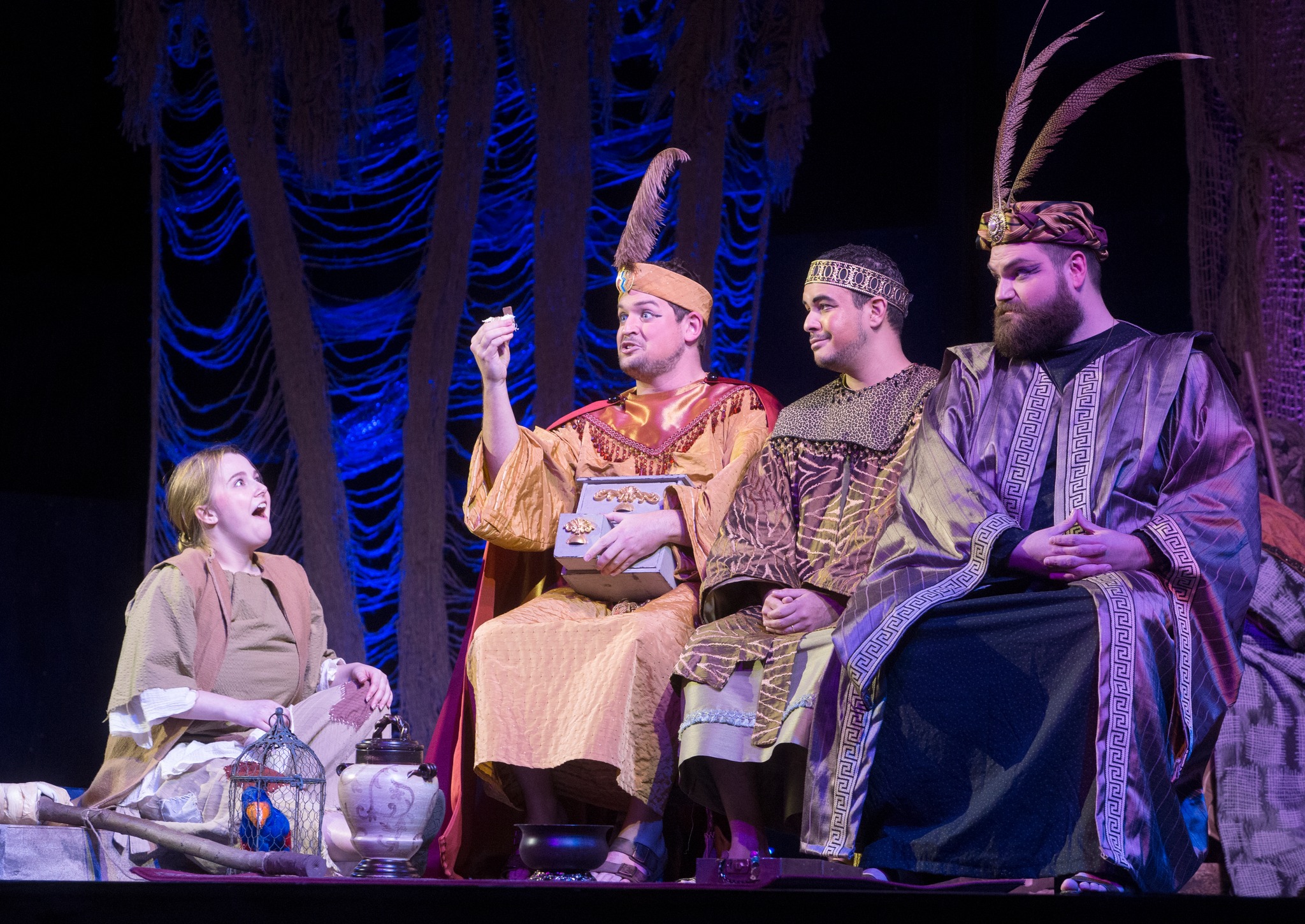Content warning: this article references ongoing political violence.
On a sunny afternoon in December, I took a break from exam preparations to experience my first show of the holiday season: The University of Alabama Opera Theatre’s annual performance of Amahl and the Night Visitors, with music and lyrics by Gian Carlo Menotti. The third production of the 2023–24 season, like all UA Opera Theatre Productions, it was held in Bryant-Jordan Hall.
Amahl and the Night Visitors is an opera in one act written for and first performed via telecast in 1951. It fictionalizes the journey of the “Wise Men” referred to in Judeo-Christian tradition who were present at the birth of the prophet Jesus in Bethlehem, a town located in what is now the Palestinian West Bank. (Usually flooded with tourists for the holiday season, Bethlehem was completed shuttered this year and remains so due to the Israel-Palestine conflict.) This telling was deeply informed by Menotti’s own Italian childhood, whose holiday traditions include the three kings, or wise men, bring children gifts on Christmas Eve, the night of December 24, and is suffused with comedy, musicianship, and cheer.
Under a vaulted, wood-paneled ceiling, the entirety of Bryant-Jordan Hall was employed as the playing space for the production. Shepherds dressed in cloaks and sandals milled about the crowd introducing their stuffed sheep to members of the audience. The musicians warmed up in the orchestra pit, and as the director approached them, a hush fell over the room. Attention shifted from excited conversation to the lush landscape on the stage; a ragged red quilt covered a small bed, while brown scraps of fabric, a small kitchen and fireplace, and a broom outlined the rest of the playing space, all highlighted by a warm glow. As the overture played, the shepherds scurried through the stage door and the show began.

The lights came up on a cold winter’s night and Amahl, a young boy reminiscent of Dickens’s Tiny Tim due to his physical disability and need to utilize home-made crutches to get around. When Amahl’s mother called him inside, he tried to tell her about the glittering star that appeared above their house—the star of David that, as the Biblical story goes, led three faraway kings to Bethlehem. She lovingly patronized Amahl, explaining that there is no time for dreaming when they had as many pressing needs as they do; they had no wood for fire, and she did not know how they will eat. Amahl cheerfully responded that if they must beg, they will become the best beggars there are.
Thinking about accessibility both onstage and off, subtitles played on the projector above the action, helping all to understand the heightened speech pattern utilized in opera. While making the production more accessible, the subtitles also ensured more audience-wide understanding of the content, and I became more and more invested in their story.
In this opening scene, I was struck by the commitment of the cast and crew. The conductor, the instrumentalists, and the vocalists blended together seamlessly into a world which, while full of the spectacle typical of opera, was also committed to a sense of believability in the story. While I sat in the theater, I forgot I was watching a show at all. I found myself gradually resonating with the intrinsic optimism demonstrated by Amahl. His over-excitedness, a trademark of children especially around the holidays, struck me even more with the grave circumstances of his family—and, I realized later, the circumstances of those families suffering through war today in Bethlehem. In observing a child’s appreciation of, if nothing else, the break in the monotony that a holiday provides, I found myself reaching backward to my own past for that same appreciation, which seems to fade with adulthood.

My reflection was suddenly broken when the conductor turned over his shoulder to cue voices from the back. Three kings entered from the back of the auditorium, their entrance punctuated by resounding, bass voices. They processed through the audience wrapped in colorful cloaks, carrying treasures for the newborn child and singing in reverberating harmony. When the three kings entered the dwelling, Amahl and his mother, who had neither firewood nor food to make their stay comfortable, employed the resources of the nearby shepherds to help provide for the kings’ needs. When the three showed Amahl and his mother the riches they were traveling with, they pondered how much any small amount would ameliorate their circumstances. With this realization, Amahl’s previously unwavering optimistic outlook on his life with his mother fractured.
As Amahl struggled with this new realization, I found myself questioning the morality of gifting all these treasures to a newborn baby when a family in drastic need is directly in front of them. The precarious positioning of the holidays for such families was underscored by this show. I realized that, despite the riches shown to Amahl and his mother by the three kings, the small family’s situation had improved with the kings’ visit. Even though they were required to utilize their neighbors’ food and firewood to house the three kings, they were now also enjoying those resources. The only reason Amahl felt worse about their situation is because he compared their poverty to the wealth of the kings; comparison was indeed the thief of Amahl’s joy.

Through the events of the story and the benefits they received from their interactions with the three kings, Amahl and his mother ultimately realized that the best rewards, especially in the holiday season, are reaped from giving. Both Amahl’s little family and the three kings leave the story more fulfilled than they entered it. The ending of this joy-filled opera emphasizes a spirit of giving, regardless of what one is able to give. I found this lesson in the weight of gift-giving especially relevant in light of the recent holiday season, with its conspicuous consumption and anxiety it can produce when one’s wish to give does not match one’s means. The best way for me to keep a child-like optimism for the holidays is to facilitate a spirit of giving, whether that be giving resources, encouragement, or even just a smile.
Amahl and the Night Visitors was produced by The University of Alabama Opera Theatre in Bryant-Jordan Hall on December 10, 2023. It was written by Gian Carlo Menotti and directed by Paul Houghtaling. The cast included Jenna Johnson (Amahl); Alanna Perrin (The Mother); Philip McCown (King Kaspar); Albert Andrade (King Balthazar); Charles Daniel (King Melchior); and Greg Vander Wal. The Quartet of Shepherds and Shepherdesses was played by Kate Paras, Maria Jo Phelps, Thomas Sagona, and Peter Vander Wal. The creative team included Laura Pritchard (Director); Scott Santoro (Conductor and Music Director); Zoe Rose Pallas (Stage Manager and Assistant Director); Thomas Sagona (Chorus Director); Andrew Haueter (Costume Design); David Jones (Lighting Design); Marla Moss (Scenic Design and Painting); and Stella Broussard (Supertitle Operator). The orchestra included Anthony Zamora (Piano); Sarah Vander Wal (Cello); Brittney Patterson (Flute), and Erik Larson (Oboe).

